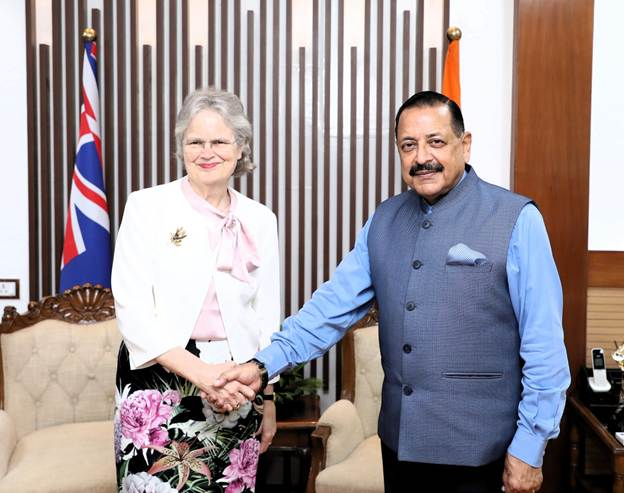India, South Australia Deepen Space and Marine Ties Amid Axiom-4 Milestone
“Australia’s consistent support, especially in critical aspects of our Gaganyaan human spaceflight mission, is deeply appreciated,” said Dr. Singh, noting India’s growing global stature in the space domain.

- Country:
- India
In a moment of profound diplomatic and scientific significance, South Australia Governor Frances Adamson AC, currently on an official visit to India, met with Union Minister Dr. Jitendra Singh, Minister of State (Independent Charge) for Science & Technology, Earth Sciences, Space, and Atomic Energy, to chart a new course in India-Australia collaboration in frontier technologies, particularly in the space and marine sectors.
The high-level interaction coincided with a moment of national pride—the live launch of the Axiom-4 mission, featuring Indian astronaut Group Captain Shubhanshu Shukla. Governor Adamson joined Minister Singh at Anusandhan Bhawan to watch the historic broadcast, as Shukla ascended into orbit as part of an international crew heading to the International Space Station (ISS).
“It is a proud and defining moment for India, and we are honoured that H.E. Frances Adamson witnessed this milestone, reflecting the deepening India-Australia partnership in frontier science and technology,” said Dr. Singh.
A Decade of Bilateral Space Collaboration
The meeting between the two dignitaries offered an opportunity to review the progress and potential of India-Australia space cooperation, which has expanded steadily since the 2012 Inter-Governmental Agreement (IGA). The creation of the Australian Space Agency (ASA) in 2018, followed by a key amendment in 2021, has significantly energized bilateral ties.
“Australia’s consistent support, especially in critical aspects of our Gaganyaan human spaceflight mission, is deeply appreciated,” said Dr. Singh, noting India’s growing global stature in the space domain.
He referred to the April 2025 visit of Indian space teams to Canberra, where discussions focused on Crew Module Recovery operations. These face-to-face dialogues with Australian ministries and scientific institutions have further accelerated momentum in joint space exploration.
From Earth to Space: Biotech Experiments Now Aboard the ISS
One of the most notable symbols of Indo-Australian scientific partnership is the contribution of indigenous space biotechnology kits, developed jointly by the Department of Biotechnology (DBT) and ISRO under a formal MoU. These kits, now being tested aboard the ISS by astronaut Shukla, are exploring the growth of edible microalgae in microgravity—a potential game-changer for long-duration space missions.
“India is pioneering research at the intersection of space biology and space medicine, and our kits represent a first-of-its-kind international experiment,” Dr. Singh remarked.
Microalgae are seen as a nutrient-rich and sustainable food source for future astronauts, contributing to the development of closed-loop life support systems critical for missions to the Moon, Mars, and beyond.
Public-Private Synergies: Expanding the Innovation Ecosystem
Dr. Singh highlighted the expanding role of Public-Private Partnerships (PPPs) in India’s space strategy. He welcomed Australia’s interest in working with Indian space startups, praising initiatives like ASA’s International Space Investment – India Stream, which supports joint R&D and innovation ventures.
“India’s space journey today is not just a national effort—it is powered by a collaborative, global spirit, and we see Australia as a key and trusted partner,” Dr. Singh affirmed.
The Minister also invited Australian companies and research institutes to explore collaboration under IN-SPACe, the government’s nodal agency promoting private participation in space ventures.
Ocean Collaboration on the Horizon
Extending the spirit of cooperation beyond outer space, both sides discussed the initiation of an India-Australia Marine Cooperation Framework, with emphasis on:
-
Sustainable marine resource exploration
-
Oceanographic research
-
Climate resilience and conservation efforts
-
Technology exchange in marine science
With both nations boasting vast coastlines and shared interests in the Indo-Pacific, the proposed partnership holds promise for joint missions, marine biodiversity protection, and blue economy development.
Australia Applauds India’s Scientific Rise
Governor Frances Adamson lauded India’s recent space achievements, especially the growing visibility of Indian astronauts on international missions.
“Australia deeply values its scientific and strategic partnership with India. We look forward to building on our shared vision across space exploration, marine science, and innovation,” she said.
She also conveyed Australia’s best wishes for the upcoming Gaganyaan mission, India's first indigenous manned spaceflight, scheduled for launch in the near future.
The Governor was accompanied by Mr. Philip Green, Australian High Commissioner to India, reaffirming Canberra’s strategic interest in deeper scientific ties with New Delhi.
A Shared Vision for a Technological Future
The visit of Governor Adamson and the celebratory context of Axiom-4’s successful launch underscore the growing strategic depth of the India-Australia partnership in science, technology, and innovation. With converging interests in space missions, biotechnology, marine exploration, and startup ecosystems, both nations are poised to play pivotal roles in shaping a sustainable, innovation-led global future.
As India charts its path toward becoming a “Viksit Bharat” (Developed India) by 2047, partners like Australia remain crucial allies in advancing not just technological aspirations, but shared global leadership in science-driven development.
- READ MORE ON:
- India-Australia Space Cooperation
- Axiom-4
- Frances Adamson
- Jitendra Singh
- Shubhanshu Shukla
- Gaganyaan
- ISRO
- Australian Space Agency
- Space Biotech
- Microalgae in Space
- Marine Science Collaboration
- Space Medicine
- Indo-Australian Ties
- International Space Station
- Public-Private Partnerships
- IN-SPACe
- Blue Economy
ALSO READ
Indian astronaut Shubhanshu Shukla's Axiom-4 mission to International Space Station postponed to June 22.
SpaceX's Falcon-9 rocket lifts-off from NASA's Kennedy Space Centre at 12:01 pm IST towards the International Space Station.
Axiom-4 mission expected to dock at International Space Station on Thursday at 4:30 pm IST, capping a 28-hour journey.
SpaceX's Falcon-9 rocket lifts-off from NASA's Kennedy Space Centre at 12:01 pm IST towards the International Space Station.
India's Shubhanshu Shukla sets off on a historic space odyssey on board Axiom-4 mission to International Space Station.









